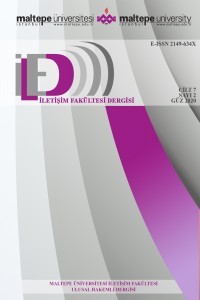Michel Foucault’da İktidar ve Özgürlük Kavramlarının Orhan Tekelioğlu, Cem Deveci ve Tina Besley’in Çalışmaları Bağlamında Değerlendirilmesi
Bu çalışma “Benim rolüm insanlara hissettiklerinden çok daha özgür olduklarını göstermek” diyen Foucault’nun iktidar ve özgürlük ve kavramı üzerinde eleştirel bir tartışma yapmayı amaçlamaktadır. Michel Foucault’da “İktidar ve Özgürlük” kavramları seçilen üç makale çerçevesinde ele alınacaktır. Orhan Tekelioğlu, Cem Deveci ve Tina Besley’e ait olan bu makalelerin ortak noktası, Michel Foucault’un terminolojisini kullanarak iktidar ve özgürlük kavramları üzerine yazmayı tercih etmiş olmalarıdır. Çalışmada öncelikle her yazarın görüşleri kısaca özetlenecek ve ardından tümü için eleştirel bir değerlendirme yapılacaktır. Özellikle Foucault’un kendilik teknolojileri, etik ve özgürlük kavramları ele alınacaktır.
Anahtar Kelimeler:
Michel Foucault, söylem, özgürlük, etik, iktidar, kendilik teknolojileri
Evaluation of Power and Freedom Concepts in Michel Foucault within the Context of Orhan Tekelioğlu, Cem Deveci, and Tina Besley
This work aims to make a critical discussion on Foucault's concept of power and freedom, saying “My role is to show people that they are much more free than they feel”. Michel Foucault's concept of Power and Freedom will be discussed within the framework of three selected articles. The common point of these articles, which belong to Orhan Tekelioglu, Cem Deveci and Tina Besley, is that they chose to write on the concepts of power and freedom by using the terminology of Michel Foucault. In the study, the opinions of each author will be briefly summarized and then a critical evaluation will be made for all. In particular, Foucault's self-technologies, ethics and freedom concepts will be discussed.
Keywords:
Michel Foucault, discourse, freedom, ethics, power, self-technologies,
___
- Besley, T. (2005). “Foucault, truth telling and Technologies of the self in schools”. Journal of Educational Enquiry, 6, 1, 76-89. Deveci, C. (1999). “Foucault’nun İktidar Kavramsallaştırmasında Siyasal Boyutun Ayrıştırılamazlığı”. Doğu Batı, 3, 9, 25-44. Davidson, A. (1997). Introductory remarks to Pierre Hadot. Chicago and London: University of Chicago Press, 195, 202. Foucault, M. (2016). Özne ve İktidar, İstanbul: Ayrıntı Yayınları. Foucault, M. (2001). Fearless speech (ed J Pearson). Los Angeles: Semiotext(e). Foucault, M. (1997). “The ethics of the concern for self as a practice of freedom” (trans Robert Hurley and others). In P Rabinow (ed) Foucault, M. (1954-1984). Ethics, subjectivity and truth: the essential works of Michel Foucault, London: Penguin Press, 1, 281-301. Foucault, M. (1988). “Technologies of the self”. In L H Martin, H Gutman and P H Hutton (eds) Technologies of the self. Amherst: University of Massachusetts Press, pp 16-49. Foucault, M. (1980). The History of Sexuality, vol. 1, New York: Vintage Books. Keskin, F. (1997). “Foucault da Öznellik ve Özgürlük”. Toplum ve Bilim Dergisi, 73, 30-34. Keskin, F. (1999). “Söylem, Arkeoloji ve İktidar”. Doğu Batı, 3, 9, 15-24. Laclau, E. (2015). Evrensellik, Kimlik ve Özgürleşme. Birikim Kitapları. McNay, L. (1992). Foucault and feminism: power, gender and self. Boston: Northeastern University Press. Peters, M.A. (2000). “Writing the self: Wittgenstein, confession and pedagogy”. Journal of Philosophy of Education, 34, 2, 353-368. Rose, N. S. (1989). Governing the soul: the shaping of the private self. London: Routledge. Tekelioğlu, O. (1999). “Moderniteye Sıkışan Özgürlük, Foucault'nun Kendilik Teknolojilerine Bir Bakış”. Doğu Batı, 3, 9, 45-56. Wallerstein I. (2016). Bildiğimiz Dünyanın Sonu, İstanbul: Metis Yayınları.
- Yayın Aralığı: Yılda 2 Sayı
- Başlangıç: 2014
- Yayıncı: Maltepe Üniversitesi
Sayıdaki Diğer Makaleler
Enes ÇOLAK, Şenay YAVUZ GÖRKEM
Eleştirel Ekonomi Politik Perspektiften Devlet ve Medya İlişkisi
